Exclusive TIFF Interview: Cast and Director of The Umbrella Men
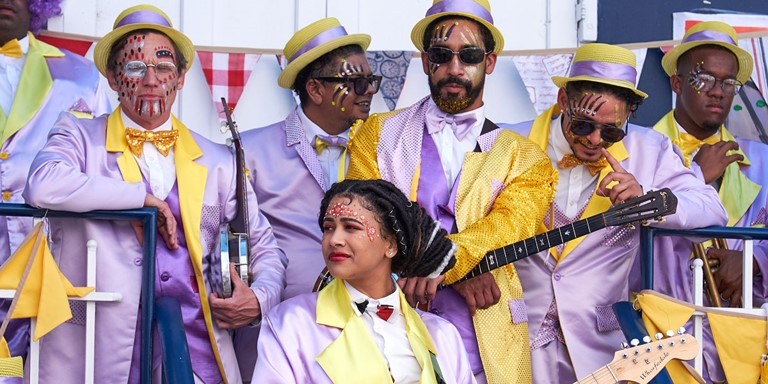
When musician Jerome Adams flies into Cape Town for his father’s funeral, he finds his dad has bequeathed him the Bo-Kaap community’s beloved Goema Club. Along with the Club comes the care of The Umbrella Men, the legendary minstrel troupe led by his father. Soon Jerome discovers the Club comes with a huge bank overdraft, due in two weeks for repayment under threat of repossession. Jerome decides to rob the bank itself under cover of the annual carnival parade when thousands of minstrel troupes will invade the streets in competition. As Jerome plans a bank heist, he reconnects with friends and community, rediscovering the importance of people and place and what it means to come home.
The Umbrella Men has its world premiere at Toronto International Film Festival, September 8-18, 2022 as part of the TIFF Contemporary World Cinema and TIFF Festival At Home programming. Showtimes here.
Classic Couple Academy sat down with The Umbrella Men cast players Jaques da Silva (Jerome), Shamilla Miller (Keisha), Keenan Arrison (Mortimor) and director for John Barker an exclusive interview. Our chat follows.
How did you collaborate as a cast and crew to ensure the comedic elements of the story came through?

John Barker: It was very important that we got the right people for the right roles. I think most good actors can take a good script and can deliver comedy lines. They don’t necessarily have to be slapstick comedians. Good performers, as these three actors are, can deliver those comedic beats that we need.
Shamilla Miller: Being an actor, you’re playing the truth in the dialogue. If there is a well-written script, and playing the truth of it, I feel like that joke will come across if you’re playing the beats right. Also, I think in the culture that we are portraying in this movie—the culture of these people and this community—there is a lot of humor in the type of dialogue they’re using, the slang and all the jargon. It’s all very playful and comedic even in the way it sounds, and the way language is used. That, coupled with the excellent scriptwriting, just made it this cute little comedic thing.
Keenan Arrison: I can jump in. I think one of the things that John gave me in my casting for Mortimer and that helped me with my audition was that he said, “Remember that none of these players, none of these people, know that they’re in comedy.” That helped me to kind of just shift the focus of it and kind of pitch it differently as to all of the comedy. So, these guys don’t know that they are in these comedic situations. What they might find funny, we find that serious. But I guess to the audience, it’s very funny. And it was a fine line to tread, but I think with John at the helm guiding us, I think we pulled it off cleverly.
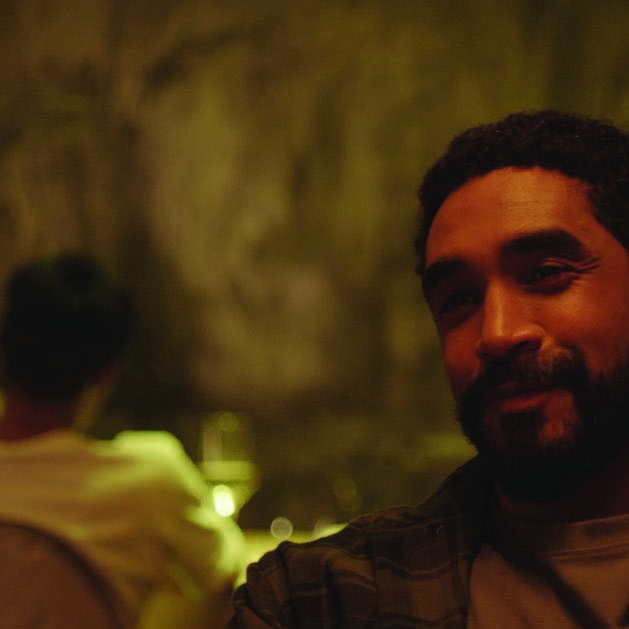

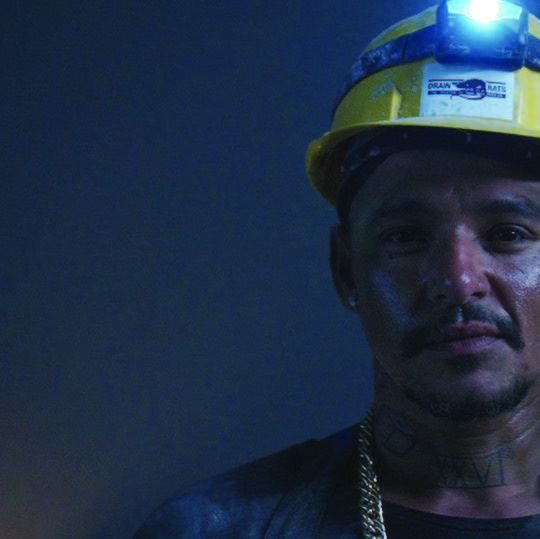
How important were different languages, and even slang, in delivering the film’s dialogue to making these characters authentic?
John Barker: I was fortunate to work with Kenan many, many years ago and I knew his strengths. When you watch actors, you realize that you know what they can potentially do. I had met with Shamilla, and I’ve been watching her progress and her work. And I was lucky enough to work Jaques too on a telenovela a few months prior to starting to do this. One of the main reasons I was very excited about doing that show was because I could actually get to see Jaques, and not even just his acting but just hang out with him and speak to him. The moment you have a conversation with somebody you start to understand what they can deliver. Casting these actors in these roles, you know that they can deliver this language, even if they’re not all based in Cape Town. You know, that with their family ties to the community, you know that the language that they can handle and know that they can pull it off. And once we did a read-through everyone was spot on.
Shamilla Miller: The type of language used within the community is very specific. I think it would be the same in any place that you grow up where you’re a part of a country but there are certain subcultures that speak certain ways. To really portray the language properly is to portray the community properly is to portray the culture properly. So that was a very important aspect of the film—to show the authenticity of these characters and of the place that we’re shooting in.
Jaques da Silva: Often what you find anywhere in the world is that there are standards. Where we come from, the education system was very much based on the English system and so often at school there was a right way to speak. There’s something really special about this film—being able to use our authentic voices. A real celebration of the culture is a celebration of how we speak, our style, our language. I’m quite happy that you use the term different languages as opposed to just slang because it isn’t just slang, it is it is a way of speaking for this community.
Keenan Arrison: Because this home is so location specific, in Bo-Kaap there is a dialect of vernacular that they speak and a rhythm in which they speak. So, we wanted to stay true to that and Cape Town specifically as a whole and South Africa as a whole knows when you come from Cape Town, you sound a certain way and when you come from Johannesburg you sound a certain way. And so, we had to find the sort of middle ground to make it sort of globally understandable, but then also true to the authenticty of the location. It took some practice to get into it, and I think I think we pulled it off.
How do the family and community ties depicted in the film reflect your own lived experience? Reflect the residents of the Bo-Kaap area of Cape Town?
Jaques da Silva: For me, my doorway into the story was the relationship between Jerome and his dad. This sense of I think it is quite familiar to everyone of having a dad with a name and of being part of a community where you kind of feel like your father doesn’t belong to you. He belongs to the neighbor’s kid who has more access to your dad than what you do. And so, as an individual as a young man trying to go out and leave home to make a name for himself, that was my entry point. My dad passed away recently, and that being my way in and talking about the film so much recently, it’s also so great that I was able to honor our relationship and rediscovering each other within this film. He was so proud of the film, and he saw it. He saw the premiere back in Cape Town. So, for me that was the hook, and it is so relatable and common.
Keenan Arrison: My tie in was the fact that I grew up in this community. I grew up in Bo-Kaap; I went to school there. Just to find myself in a space where as a kid I was walking the streets—those very streets that we were shooting on. It felt a full circle moment for me. And I told John on those days, I did get a bit emotional because I never ever thought that I would one day be walking the streets filming on them in this very community. So, I kind of knew exactly how important that that community is to me and that’s what I wanted to bring across. That’s a community of loving family, of neighbors where everybody’s family. It’s a village that takes a village to raise a kid and all of that. It’s called ubuntu here as we know it in South Africa. And it was really a sense of Ubuntu, a sense of togetherness. To be able to bring that across was really a big, big moment for me.
Shamilla Miller: It is a community that looks after their own. It’s like if I have two things, I’m going to give you one because I want both of us to have one each. It’s like that kind of spirits—very loving, very open. It’s beautiful.
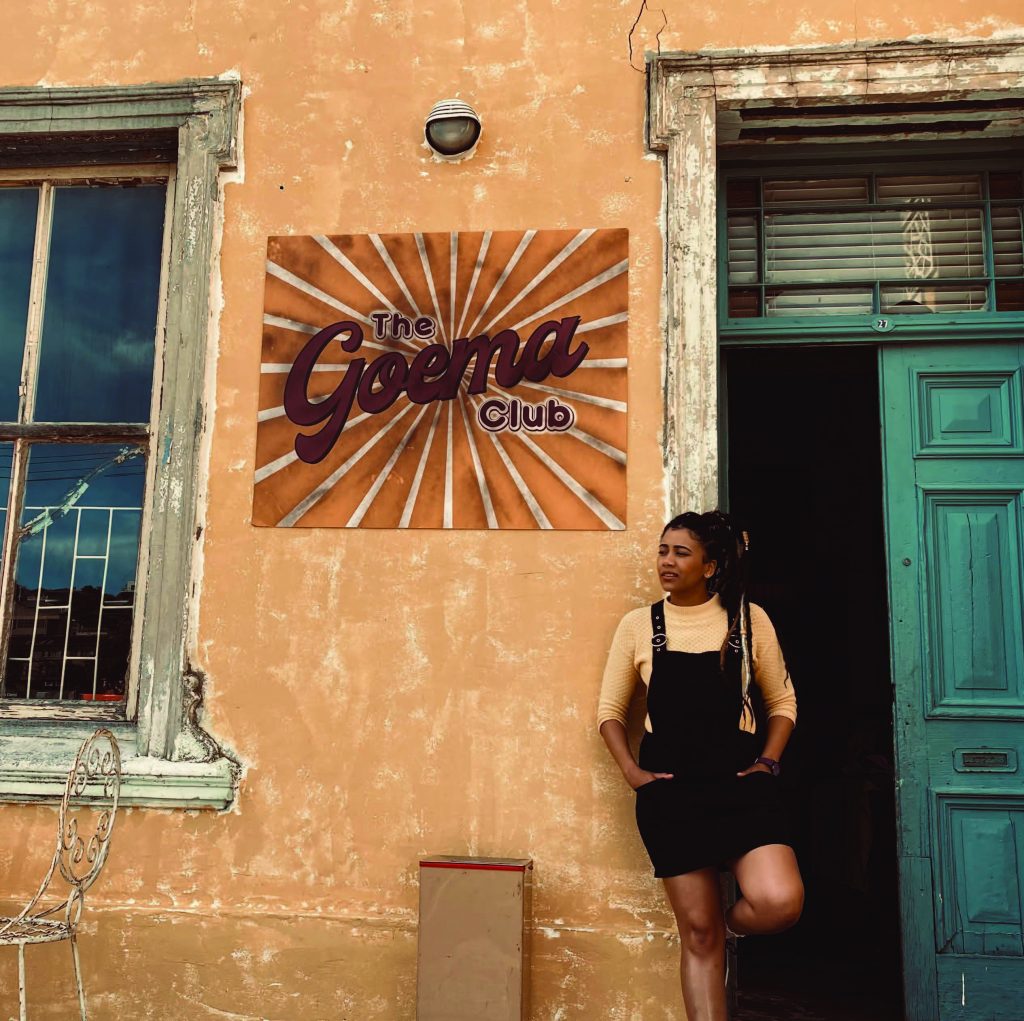
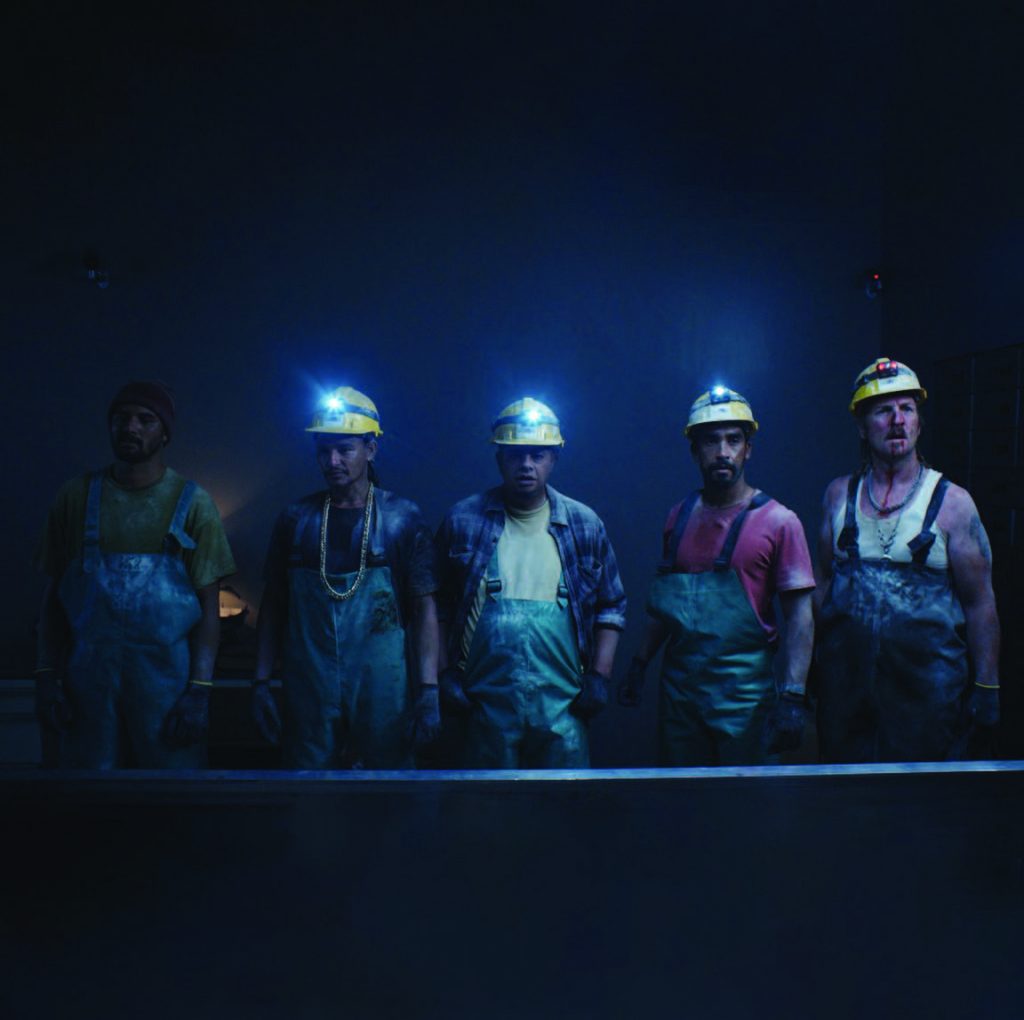
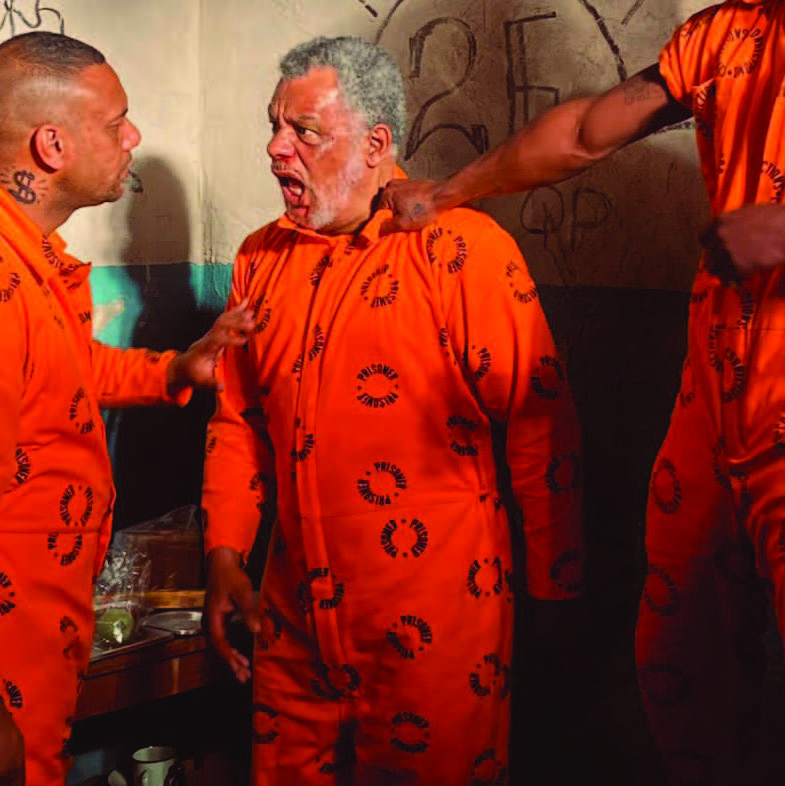
The bank heist caper is the perfect vehicle for an ensemble cast. Did you draw on any films in the genre for inspiration?
John Barker: Yeah, I love that genre. There’s a film called The Italian Job—original one with Michael Caine. So that is about a Champions League game that they played in Rome, and they use the end of the game when all the people stream out into the streets and it’s congested, and the city’s in gridlock and the cops can’t get through to wherever they want because of traffic jams. Michael Caine gets this idea to get three small minis and they can go through the tunnels, and not one can chase them as they get gold bullion out of Rome. That hugely inspired this film as we use the carnival as a way of shutting down the streets.
So, The Italian Job was a huge influence as were lots of other strong heist films, but also a big thing is the music influence. I used Birdman as a reference, Mo Better Blues, even Robert Altman’s film on jazz The Cotton Club. Even Rififi is about guys that rob a bank, but they’re also based in a jazz club. I kind of used many heist references, caper and film references because I love films where the with music is one of the main characters in the film. Because this is about a group of minstrels and jazz musicians, the music had to be a huge character. We had to find somebody as good a musician as Kyle Shepardtocreate these beautiful original tracks that felt as good as the performances of Jaques, Shamilla and Kenan.
Keenan Arrison: For me while we were shooting the film, I immersed myself in Ocean’s Eleven and Ocean’s Twelve because I also felt like it had the energy that John was going for—together with this ensemble cast and how they play off each other and the music in particular. That was definitely one of my references.
What do you hope international audiences take away from experiencing The Umbrella Men? What is your hope for how South Africans experience the film?
Shamilla Miller: Internationally, I feel like a lot of people have said how this was the first time they’ve seen Cape Town, they’ve seen this culture, this theme, this dynamic of people on screen. So, I think to showcase the beauty of the stories of the people that live here and the dynamics of the city and within this community on an international stage is just so beautiful because it’s not something that is shown often. Out of South Africa to have a story that is light and comedic—it still has a struggle story—but there’s entertainment and comedy in it and it is not as cumbersome as some films have been in the past. It shows a different dynamic on the international stage. It’s like “hey look, we can also make very entertaining movies guys.”
For South African audiences, I just want to be part of the representation movement. When I was younger, I wanted to see people that looked and sounded like me on screen. I am very happy to be part of a movie that represent represents that culture that we’re trying to represent.
Keenan Arrison: I think it’s also because it’s such a quintessential authentic Cape Town story for the first time. There are loads of international films and local stuff that shoot in Cape Town, but I feel like for the first time it has a voice. I think this is so truly representative of what Cape Town stands for and what it is—the community, the sense of community, the sense of just having fun, the music. If you ever visit Cape Town, I think that’s what you’ll take away from it. And I think it’s been captured so beautifully in this film—the rich tapestry, the colorful houses, the people. It’s fully representative of Cape Town, and I think, firstly, South Africa and Cape Town should be proud. The feedback that we’re getting from people who have already seen this film, it’s been great. I think it’s time for the world to see us as we are.
Jaques da Silva: The fact that it’s being seen internationally seen at the Toronto International Film Festiva, for me, is bonus. The work, the purpose, who this film is for is here and they are now seeing the movie and seeing themselves represented. This is for this little boy Jacques who wanted to be an actor and wanted to be an action hero and wanted to do cool stuff, but that was always with an American accent in how I envisioned that right. The fact that there is a little me out there who’s hopefully hearing his own voice and going, it’s tangible. It’s right here. It’s us. It’s our stories. It’s recognizable. It’s my neighbor. It’s me. TIFF—absolute bonus. The work is happening at home. It’s brilliant.
What does it mean to you to represent the contemporary African film industry at the Toronto International Film Festival?
John Barker: It’s a really exciting time because there’s a lot of things that are happening. Streamers are making it possible now to talk for young filmmakers, Black filmmakers, female filmmakers, to actually make films. So, I think this is the time now to tell our stories. And I hope that further down the line, there are people from the Cape Malay community who are making the next heist film or another film on the west coast of South Africa because I think the time is now if you have a script, if you have a strong enough idea, there’s actually a demand for our niche kind of filmmaking and storytelling. Our small community telling a story about a small community suddenly, now it’s just told well, it can be seen by the world. So, I think we’re at a very exciting time.
Shamilla Miller: I’m just I’m so proud. I’m so proud to be a part of this team. And I’m proud of every single crew member from top to bottom and cast. We did something so beautifully and we did it together. To take that and to have the opportunity to take that internationally and to spread that love, I’m so proud of us.
Jaques da Silva: For me, what I’m excited about is the fact that we are the ones to represent this film is that I know we are not afraid to tell you that we are not the only ones. There are so many directors and storytellers and stories out here that are being made that are of excellent quality and standard. And we’re just getting started. So, I hope we are whetting the appetite to come on over. We’ve got stories to tell.
Keenan Arrison: I definitely think that this is a piece that is a voice for the people, by the people. It stands out. It’s a piece that I think will stand out for years to come. People will reference this film and our voice is becoming louder. And louder. The more films we make, the more stories we tell, local stories we tell, we’ve got so much to offer the world. And I think the time is now.
